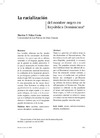Identificador persistente para citar o vincular este elemento:
https://accedacris.ulpgc.es/jspui/handle/10553/72385
| Campo DC | Valor | idioma |
|---|---|---|
| dc.contributor.author | Núñez Ureña, Maritza | en_US |
| dc.date.accessioned | 2020-05-13T17:19:01Z | - |
| dc.date.available | 2020-05-13T17:19:01Z | - |
| dc.date.issued | 2009 | en_US |
| dc.identifier.issn | 1794-8290 | en_US |
| dc.identifier.other | WoS | - |
| dc.identifier.uri | https://accedacris.ulpgc.es/handle/10553/72385 | - |
| dc.description.abstract | There is a great lack of African terms in the dictionaries of Dominicanisms. The few African words still used in the Dominican Republic, particularly in common language, are distorted with a scornful sense. The prejudice towards Africans in this Caribbean island has affected all aspects of Dominican's expressions. In fact, from the nineteenth century onwards, a large sector of intellectuals and political leaders has developed a pro-Hispanic identity discourse that has caused a breakup between the African heritage and the self-perception of Dominicans. This phenomenon is reflected in the popularity of names and toponymics of Spanish or Taino origins, as well as in the pejorative connotation attached to African's names or Haitian's names which in the imaginary Dominican popular mean the same. | en_US |
| dc.description.abstract | Los vocablos africanos son los grandes ausentes de los diccionarios de dominicanismos. Los pocos que aún se utilizan, sobretodo en el lenguaje popular, tienen por lo general un sentido peyorativo. y es que el menoscabo del hombre africano se ha reflejado en todos los aspectos de la construcción nacional dominicana. La exaltación de la hispanidad promovida por dirigentes políticos e intelectuales desde el siglo XIX, ha causado el divorcio entre los elementos de origen africano y la auto-percepción de las masas dominicanas. Este fenómeno se refleja en la popularidad de los nombres propios o toponímicos de origen español y en menor grado indígena, así como y en la connotación negativa, muchas veces insultante, que se le atribuye a los nombres de origen africano o haitiano que, en el imaginario popular dominicano, es lo mismo. | en_US |
| dc.language | spa | en_US |
| dc.relation.ispartof | Cuadernos De Literatura Del Caribe E Hispanoamerica | en_US |
| dc.source | Cuadernos De Literatura Del Caribe E Hispanoamerica [ISSN 1794-8290] (9), p. 161-175 | en_US |
| dc.subject | 55 Historia | en_US |
| dc.subject.other | Names | en_US |
| dc.subject.other | Self-Discrimination | en_US |
| dc.subject.other | Identity | en_US |
| dc.subject.other | Racialization | en_US |
| dc.subject.other | Nombres | en_US |
| dc.subject.other | Autodiscriminación | en_US |
| dc.subject.other | Identidad | en_US |
| dc.subject.other | Racialización | en_US |
| dc.title | La racialización del nombre negro en República Dominicana | en_US |
| dc.title.alternative | The Racialization Of The Black Name In The Dominican Republic | en_US |
| dc.type | info:eu-repo/semantics/Article | en_US |
| dc.type | Article | en_US |
| dc.identifier.isi | 000414749000008 | - |
| dc.identifier.eissn | 2390-0644 | - |
| dc.description.lastpage | 175 | en_US |
| dc.identifier.issue | 9 | - |
| dc.description.firstpage | 161 | en_US |
| dc.investigacion | Artes y Humanidades | en_US |
| dc.type2 | Artículo | en_US |
| dc.contributor.daisngid | 10429341 | - |
| dc.description.numberofpages | 15 | en_US |
| dc.utils.revision | Sí | en_US |
| dc.contributor.wosstandard | WOS:Urena, MVN | - |
| dc.date.coverdate | Enero-Junio 2009 | en_US |
| dc.identifier.ulpgc | Sí | es |
| dc.description.esci | ESCI | |
| item.fulltext | Con texto completo | - |
| item.grantfulltext | open | - |
| Colección: | Artículos | |
Visitas
68
actualizado el 10-ene-2026
Descargas
19
actualizado el 10-ene-2026
Google ScholarTM
Verifica
Comparte
Exporta metadatos
Los elementos en ULPGC accedaCRIS están protegidos por derechos de autor con todos los derechos reservados, a menos que se indique lo contrario.
